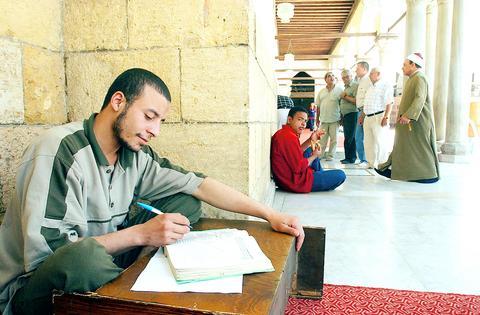Egypt's religious authorities raided book stores and stands on Saturday, confiscating hundreds of publications as well as audio and video tapes they claim do not conform to Islamic teachings.
The raid came only three days after Justice Minister Faruq Seif al-Nasr granted Al-Azar, Sunni Islam's most prestigious institution, wide-ranging powers to ban and confiscate material it deems violate religious principles.

PHOTO: AP
Novels by secular writers and even unorthodox versions of the Islamic holy book, the Koran, were seized in the raids, raising concerns the religious establishment might use its new powers to suppress free thought.
Human rights groups and the liberal intelligentsia condemned the move, spearheaded by Al-Azhar's Islamic Research Center (IRC), as an attempt to stifle freedom of expression and warned that it could encourage violence against secular writers.
They mentioned two individuals in particular whose publications were targeted in the raids: Egyptian feminist writer Nawal Saadawi and researcher Ahmed Ismail.
According to the Egyptian Human Rights Center for Legal Aid, Ismail was assaulted by members of the extremist Salafist group, who denounced him as being an infidel.
The IRC demanded the confiscation of Saadawi's The Fall of the Imam, published nearly 20 years ago, for allegedly violating Islamic precepts.
The novel tells the story of a dictator surrounded by Islamic scholars, who use the Koran to justify the dictator's actions, even if that means giving false interpretations of verses in the holy book.
Alaa Abd El-Zaher, head of the IRC's videotape department, however, argued that the confiscations were only "limited to religious publications" and did not cover "literary works."
In the mid 1990s, the IRC recommended the suspension of renowned Egyptian film director Yussef Shahine's Al-Mohageer (The Emigre) and the banning of author Alaa Hamed's Voyage into the Human Mind, a philosophical reflection on faith and atheism.
The author was later jailed for six months.
Islamists also filed a case in court against Cairo University professor Hamed Abu Zeid, demanding that he be divorced from his wife.
They alleged that anti-Islamic writings had made him an apostate and therefore could not remain married to his Muslim wife, Ibtehal Yunis, a Spanish lecturer at Cairo university.
The couple was later forced to flee the country and live in exile in the Netherlands.
The Egyptian Organization for Human Rights expressed fear on Tuesday that the Justice Ministry's decision would lead to violations of freedoms, including of thought and expression, which are enshrined in the constitution.

Shamans in Peru on Monday gathered for an annual New Year’s ritual where they made predictions for the year to come, including illness for US President Donald Trump and the downfall of Venezuelan President Nicolas Maduro. “The United States should prepare itself because Donald Trump will fall seriously ill,” Juan de Dios Garcia proclaimed as he gathered with other shamans on a beach in southern Lima, dressed in traditional Andean ponchos and headdresses, and sprinkling flowers on the sand. The shamans carried large posters of world leaders, over which they crossed swords and burned incense, some of which they stomped on. In this

‘NO COUNTRY BUMPKIN’: The judge rejected arguments that former prime minister Najib Razak was an unwitting victim, saying Najib took steps to protect his position Imprisoned former Malaysian prime minister Najib Razak was yesterday convicted, following a corruption trial tied to multibillion-dollar looting of the 1Malaysia Development Berhad (1MDB) state investment fund. The nation’s high court found Najib, 72, guilty on four counts of abuse of power and 21 charges of money laundering related to more than US$700 million channeled into his personal bank accounts from the 1MDB fund. Najib denied any wrongdoing, and maintained the funds were a political donation from Saudi Arabia and that he had been misled by rogue financiers led by businessman Low Taek Jho. Low, thought to be the scandal’s mastermind, remains

Near the entrance to the Panama Canal, a monument to China’s contributions to the interoceanic waterway was torn down on Saturday night by order of local authorities. The move comes as US President Donald Trump has made threats in the past few months to retake control of the canal, claiming Beijing has too much influence in its operations. In a surprising move that has been criticized by leaders in Panama and China, the mayor’s office of the locality of Arraijan ordered the demolition of the monument built in 2004 to symbolize friendship between the countries. The mayor’s office said in

FIGHTING CONTINUES: Thai military dropped 40 bombs on border areas, Cambodia said, while Bangkok said Phnom Penh launched heavy attacks and damaged homes Cambodia yesterday accused Thailand of intensifying its bombardment of disputed border areas, even as officials from the two countries attend a multi-day meeting aimed at negotiating an end to deadly clashes. The neighbors’ long-standing border conflict reignited this month, shattering an earlier truce and killing more than 40 people, according to official counts. About 1 million people have also been displaced. Cambodian and Thai officials were in their third day of talks at a border checkpoint, with ministers of defense from the two countries scheduled to meet today. However, the Cambodian Ministry of National Defense said Thailand’s military carried out a heavy